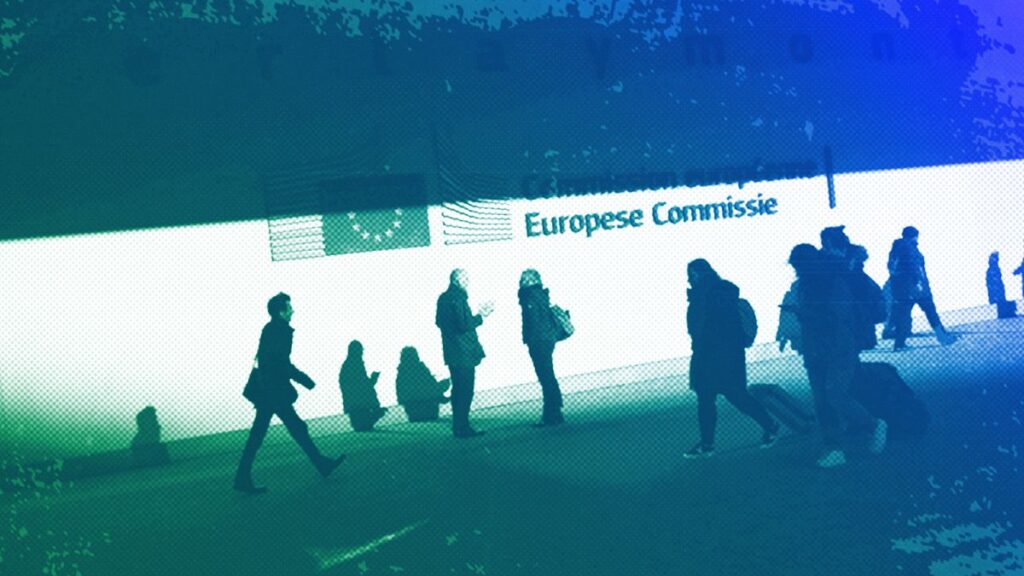By Joachim Nikolaus Steinhöfel, German lawyer
Published on
The opinions expressed in this article are those of the author and do not represent in any way the editorial position of Euronews.
Last week, German outlet Welt am Sonntag uncovered a political scandal that cuts straight to the heart of the EU’s democratic credibility.**
Leaked documents reveal that the European Commission quietly funnelled taxpayer money to environmental NGOs to fund lawsuits and orchestrated campaigns — not against polluters, but against private German companies.
The operation was carried out in the shadows, with Brussels bureaucrats and activist groups coordinating their moves behind closed doors.
The goal? Not policy. Not science. Politics. The documents suggest a deliberate effort to steer public opinion toward the EU’s climate agenda and to manipulate elected members of the European Parliament. Millions of euros changed hands in the process.
It gets better. According to the report, Commission officials enlisted “Friends of the Earth” to torpedo the EU–Mercosur free trade agreement — at the very moment other departments within the same institution were working to push the deal forward.
That’s not strategy. That’s sabotage — using public money.
When asked about all this, the Commission pleaded ignorance. A spokesman told Euronews: “Contrary to media reports, there are no secret contracts between the Commission and NGOs.”
That is perfect. If the contracts aren’t secret, let’s see them. And if they’re not published, they are secret. It’s that simple.
It’s not just bad optics — it’s a constitutional problem
The real scandal goes deeper. A growing number of NGOs have become political proxy armies — eager to be hired, eager to be used.
Some were founded for that purpose alone. At this point, it may be more honest to call them GOs: governmental organisations with a PR budget.
This isn’t just bad optics. It’s a constitutional problem. In Germany, the Federal Constitutional Court ruled in 2022 that then-Chancellor Angela Merkel violated the Constitution when she publicly condemned the democratic election of a regional governor — and demanded that the result be “reversed”.
Why? Because when the state intervenes in the political process, it ceases to be a neutral actor. And political neutrality of the state is a constitutional obligation.
This principle applies in Brussels too. EU institutions have no right to outsource political combat to organisations they bankroll — especially when they’re funding attacks on private entities or seeking to influence legislation by stealth.
The Commission is bound by the Charter of Fundamental Rights. If it can’t lawfully suppress dissent, it can’t pay someone else to do it either. Financing NGOs for the purpose of bypassing those constraints undermines institutional balance and constitutes a misuse of public funds.
When the Commission attempts to indirectly implement political measures through NGOs, it breaches the rule-of-law obligation to act within the law, and may also violate fundamental rights of others — including freedom of expression, freedom of association, and the principle of equal treatment.
Using public funds to manipulate the public is not policy. It’s propaganda.
Using the European Commission’s institutional power to target companies or rig the political process isn’t a strategy. It’s abuse. And no amount of NGO window-dressing changes that.
If the Commission wants to defend democracy and fundamental rights, it should start by respecting both.
Joachim Nikolaus Steinhöfel is one of the most renowned German lawyers specialising in media law and free speech. In 2024, he won 16 out of 16 cases against the German government before the Federal Constitutional Court. He was the first lawyer ever to obtain a preliminary injunction against Facebook for deleting and blocking users. His book “Die digitale Bevormundung” (“The Digital Paternalism”), published in 2024, was a national number one bestseller.
Read the full article here


